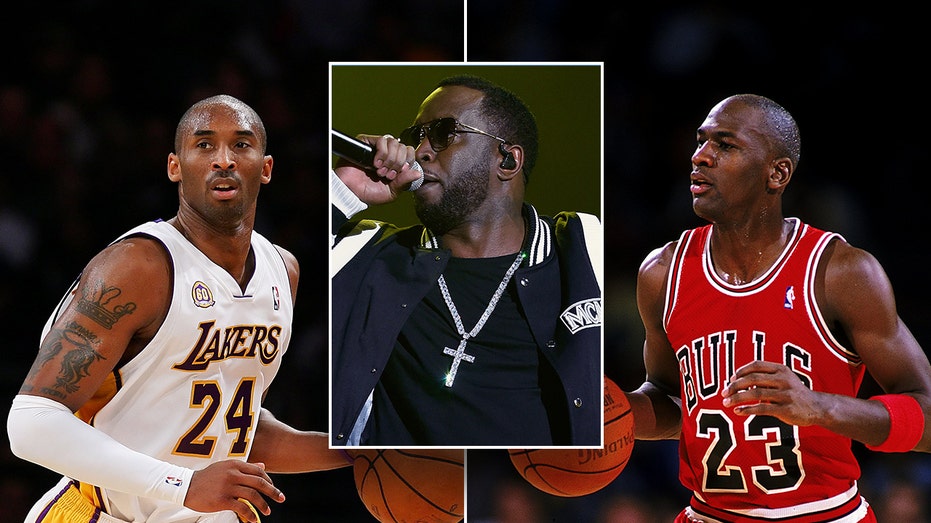The ongoing trial of Sean “Diddy” Combs has reached a pivotal moment as the prosecution nears the completion of its testimony. This high-profile case has captured the attention of many, especially with the unexpected mention of iconic basketball figures Kobe Bryant and Michael Jordan.
In a legal battle that continues to unfold, the courtroom has transformed into a stage where celebrity names carry significant weight. The prosecution’s team has sought to solidify their arguments by invoking the names of Bryant and Jordan, both of whom are renowned not only for their basketball prowess but also for their cultural impact.
This latest development comes amidst allegations against Diddy related to business practices and personal conduct that have sparked intense debate and media attention. As the trial progresses, the legal teams have engaged in a tug-of-war over evidence, witness credibility, and the implications of the testimony presented so far.
The references to the late Kobe Bryant and the legendary Michael Jordan illustrate how intertwined sports and celebrity culture have become, particularly within the context of legal matters that extend beyond the courtroom. The use of such names serves to emphasize points being made by the prosecution, aiming to draw parallels between the cases being made in the trial and the larger-than-life personas that Bryant and Jordan represent.
Kobe Bryant, who tragically lost his life in a helicopter crash in January 2020, is remembered as one of the most gifted players in NBA history. His influence transcended basketball, making him a symbol of excellence and determination. Similarly, Michael Jordan, regarded by many as the greatest basketball player of all time, has built a lasting legacy that defines success both on and off the court.
With their names brought into the fold, the jury is reminded of the heights of success and the complexities of navigating fame—issues that may resonate with their perception of Diddy and the allegations against him.
Throughout the trial, the prosecution has worked meticulously to construct a narrative that seeks to hold Diddy accountable for actions that they argue have caused harm both financially and personally to those involved. Witnesses have provided their accounts, many describing their experiences in collaboration with Diddy, both in the music industry and beyond.
This case is multifaceted, involving not just allegations of misconduct but also references to the music mogul’s influence and reach in various industries, including entertainment, fashion, and beverages. The intertwining of these elements, alongside celebrity name-drops, creates a compelling narrative that engages both the jury and the public’s perception of the case.
As the trial progresses, the audience is keen on how the defense will counter the prosecution’s claims and whether the inclusion of Jordan and Bryant’s names will have any lasting impact on the proceedings. Celebrity testimonies and references often have the power to sway opinions, revealing the weight that public perception carries in high-profile trials.
With the end of the prosecution’s case nearing, it will be crucial to observe how the defense mobilizes their strategy in light of the arguments that have been presented thus far. The defense has the critical task of dismantling the narratives laid down by the prosecution while maintaining a degree of credibility and sympathy for Diddy’s character.
The trial has not only attracted mainstream media coverage but has also drawn in an audience eager for updates, sparking discussions across social media platforms. This buzz reflects a society that remains fascinated by the intersection of celebrity and accountability, particularly in cases involving figures who have shaped cultural and entertainment landscapes.
The references made to sports legends like Bryant and Jordan in the courtroom signify that the discourse is not merely about legal proceedings but also about legacy, accountability, and the standards to which public figures are held. The juxtaposition of Diddy’s alleged actions against such esteemed examples of discipline and dedication presents a complex tableau for the jury to consider.
As the legal teams prepare for the next stages of the trial, they will undoubtedly be analyzing how public sentiment may shift as more stories are told and as descriptions of Diddy’s behavior and character are publicly aired. The anticipation builds, with spectators keen to learn how the courtroom dynamics will evolve and whether the spirit of competition embodied by figures like Jordan and Bryant will influence the proceedings.
This trial is not just about the outcome of one man’s legal issues; it is an exploration of the consequences of fame and the societal expectations placed on those who inhabit that world. The culmination of celebrity, sports, and accountability in Diddy’s trial highlights the compelling narratives that arise when star power meets the courtroom drama of real-life consequences and moral dilemmas.
As the prosecution rests, the next chapter is yet to be written in this ongoing saga. How the defense will respond and what additional angles will unfold remain to be seen as this high-stakes trial continues to captivate audiences far and wide. With significant personalities intertwined in the discourse, the story of Diddy’s trial promises continued intrigue and revelations in the days ahead.
Observers are advised to stay tuned, as the testimony and arguments heard in the courtroom will shape not only the fate of Diddy but also how the intersection of fame, accountability, and cultural narratives are navigated in a society that is often in search of justice yet charmed by the allure of celebrity.
In conclusion, as the drama unfolds, one thing is certain: the legacy of celebrities like Kobe Bryant and Michael Jordan will persist, informing discussions about success, ethics, and public figures’ responsibilities. Their names, brought into the fray, serve as a reminder that even in the realm of fame, everyone is bound by the court of public opinion and the much more consequential court of law.































